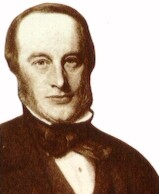James Prescott Joule (1818 - 1889)

James Prescott Joule was born on Christmas Eve, 1818, into a wealthy Manchester brewing family. He initially was educated at home, before being tutored, at the age of sixteen, by the eminent Manchester scientist John Dalton. Joule soon began to conduct independent research at a laboratory built in the cellar of his father's home. By the 1840's, scientists had realized that heat, electricity, magnetism, chemical change and the energy of motion were all inter convertible. Joule was extremely involved with this work, and between 1837 and 1847, he established the principle of conservation of energy, and the equivalence of heat and other forms of energy. By 1840 he had established Joule's Law. After working with Thomson from 1852-9, he described the Joule-Thomson effect, whereby an expanding gas is cooled as work is done to separate the molecules.
As is characteristic of many researchers, Joule's accomplishments were not limited to those things we today associate with the word "research." Much of what comes from experimental investigations results in practical devices and new technologies. In this respect one can note that James Joule was also an inventor. Amongst many of his inventions are "arc" or electrical welding, and the displacement pump. Much of his research was funded by himself, and the funds finally ran out in 1875. In the years that followed He was often ill until his death in 1889, in Sale, which is now in the Borough of Trafford.
From 1837 to 1856 Joule worked in the family brewery. In his spare time he studied the (then relatively new) subject of current electricity. He subscribed to a new journal The Annals of Electricity edited by William Sturgeon (1783 - 1850) and learned, from a paper written by Prof.M.H.Jacobi of the University of Dorpat, that electric motors offered the possibility of infinite power. His attempts to build a motor to generate infinite power failed and he gradually realised that his goal was not achievable. Instead he became interested in measuring the work done and the heat generated by electricity and, in 1840, he discovered that the rate of generation of heat by an electric circuit was proportional to the square of the current multiplied by the resistance.
This led him, by 1847, to measure the heat produced through the action of falling weights, his famous "paddle wheel" experiment. His conclusion was that all systems contain energy which can be converted from one form to another but the total energy of a closed system remains constant. Although his lack of advanced mathematical training compelled him to leave the development of the new science of energetics to Kelvin, Clausius, Rankine, Hirn and Gibbs, Joule's skilful and accurate experimental work was primarily responsible for the general acceptance of the subject. In 1847 Joule married Amelia Grimes, daughter of the Liverpool Comptroller of Customs.

Connect with us
Contact us today